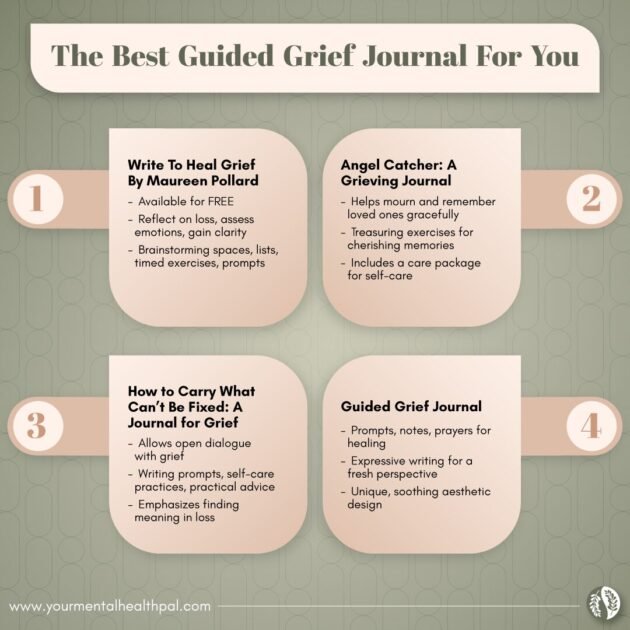Grieving is a complex process, and sometimes, healing can come from the comfort of words. Discover the best grief journals for effective support and guidance.
Grief is one of the most common (and hardest) human emotions we all experience, more so as we age. The older you get, the more the intensity of grief hits and pervades in your life.
For many, grief is associated with losing a loved one. However, it is crucial to understand that not all forms of grief are attached to death. Grief comes in a myriad of forms – from the loss of your cherished friendships, important relationships, dream jobs, or even your favorite possessions. The way we experience grief is different for all of us.
This is why it’s essential to have all the necessary coping mechanisms at hand.
Now, not all of us have the luxury of supportive friends to share our stories with. Not many would feel comfortable sharing their struggles with grief openly.
So, what’s an alternative and effective process to cope with these uncomfortable, complex, and painful feelings?
Well, the best grief journals can help.
Don’t roll your eyes just yet.
Taking up a pen and diary to write about your feelings might not be right at the top of your to-do list right now. But trust us when we say that it REALLY helps. And the best part? You don’t have to start a journal yourself or spend hours staring at a blank page for the inspiration of Shakespeare to hit you eventually.
Don’t worry; we’ve got you covered.
In this blog post, we have compiled a list of the best-guided grief journals available.
These grief journals are the perfect coping mechanisms to let you acknowledge, accept, and deal with your emotions right now. Let’s dive in.
But Wait, What Is A Grief Journal?

A guided grief journal is a personal diary or notebook specifically designed to allow individuals to cope with the pain and discomfort related to grief. It provides you with a safe space to explore your deepest emotions associated with whatever form of loss you are experiencing.
The best-guided grief journals have multiple exercises that use the expressive power of writing as an outlet for your emotions. When you put your emotions on paper, you give them a tangible form, giving you a fresh perspective and broader outlook to access them. This way, you gain a better understanding of how you are truly feeling in the moment and beyond.
What Do You Write In A Grief Journal?
If only it were that easy to pick up a pen and scribble your pain away.
Grief journaling requires some dedicated old-fashioned approach if you are starting from scratch. It can be an emotionally draining and time-consuming process to begin with; therefore, it’s important that you come up with a certain set of motivations. Here are some tips that can come in handy while starting a grief journal:
1. Find a safe space.
Where you are when you journal is vital in the whole process.
Now, we don’t mean that you need to shut yourself off in an isolated room and don your most effective pair of noise-canceling earplugs while writing your grief journal. However, finding a safe space where you can easily unwind and feel your deepest emotions without being judged is good.
2. Choose a regular time.
There is no hard and fast rule as to how many times you need to use a guided grief journal before you heal completely.
But it’s good to have a set time for using your grief journal because it gives you the required motivation to face the most discomforting emotions you are dealing with.
3. Write freely.
Sometimes, especially initially, you might have so many emotions piled up that putting them on paper will feel like a relief. Therefore, use the blank pages to write whatever that’s coming in your mind at the moment.
Don’t worry about making sense or being grammatically correct. The real point is to have your most overpowering emotions out of you to help you deal with them better.
4. Use grief journal prompts.
You might not feel the urge to write pages full of your feelings daily. Therefore, using grief journal prompts is a great way to elicit emotions lying deep within your heart.
Here are some of the most effective grief journal prompts to get you started:
- What has this experience of loss taught me?
- Who or what is my support system?
- What am I grateful for even in this moment of loss and pain?
- What has been the hardest part about dealing with this loss?
- List all the emotions that you are feeling.
- How can you be more compassionate toward yourself and the world when you are hurting?
- What is something you wished you knew about dealing with grief beforehand?
- If you could forgive yourself for one thing at this moment, what would it be?
Is Journaling Good For Grief?

YES!
We can’t stress it enough. Journaling is a highly effective coping mechanism for your grief. It gives you a safe and non-judgemental outlet for your emotions.
Journaling for grief is good because it allows you to access and feel all the bottled-up emotions that might otherwise be buried deep inside you. When you don’t deal with these emotions, they become a source of lifelong trauma. Therefore, journaling becomes a critical tool to deal with your emotions.
Here are some essential reasons why journaling for grief is great for you:
1. It becomes your companion on the lonely journey of dealing with grief.
Grief, no matter how small or big, makes you feel lonely. You can have different supportive people around you. Yet, no one might be able to feel the gravity of your pain and feelings truly. Your grief journal becomes an effective guide and companion to you at the moment you need it the most.
2. It provides you with a safe space and a healing outlet.
We live in a world that constantly judges us. Therefore, we continually hide our true feelings and vulnerabilities to not be stereotyped as weak.
However, your grief journal is a personal space that you have created for yourself. It’s a non-judgmental and safe outlet for your emotions. You can be yourself on those pages without the filters you put up for the rest of the world.

The Best Personalized Grief Journals For You
Now that we have understood why guided grief journals are important and how effective they are for healing from grief, it’s time to look at YMHP’s list of the best grief journals for you. Let’s dive in.
1. Write To Heal Grief By Maureen Pollard
Write To Heal Grief by Maureen Pollard is one of the best grief journals online, and the best part – it’s available for FREE!
Yes!
You heard us right.
A complete grief guide and workbook, Maureen’s guided grief journal allows you to:
- reflect on your loss,
- asses your emotions and feeling, and
- get clarity and a fresh perspective on your situation.
With brainstorming spaces, lists, timed free writing exercises, journal prompts, and much more – this is one of the best free grief journals with almost all the resources you need.
As you move through completing these exercises, you’ll get clarity on how you feel and hopefully heal in the process, too.
2. Angel Catcher: A Grieving Journal: A Journal of Loss and Remembrance
If you are looking to deal with a loved one’s loss, this is the best grief journal for you. It guides you through the process of mourning and eventually helps you reach a point where you can gracefully remember who you’ve lost with love and peace.
With multiple treasuring exercises, the Angel Catcher journal will allow you to remember and forever cherish your loved one’s memories. It’ll help you celebrate their existence while grieving for what you’ve lost.
Along with an amazing grief journal, Angel Catcher comes with a care package that works as the perfect self-care tool for navigating your grief journey.
3. How to Carry What Can’t Be Fixed: A Journal for Grief
In How to Carry What Can’t Be Fixed, Megan Devine directly offers a creative and open dialogue with grief. Using multiple exercises, this one from our list of the best grief journals allows you to understand the truth about your grief. It allows you to rewrite your whole story without ever being pressured to look for a happy ending.
This guided grief journal is filled with:
- writing prompts to let your emotions out,
- self-care practices to heal yourself,
- practical advice for dealing with grief, and
- ways to find meaning in your loss.
4. Guided Grief Journal
If you want to take an intentional step toward healing, this is one of the best-guided grief journals for you. Every page offers a prompt, a note, or a prayer for yourself that’ll help you navigate through the tumultuous journey of healing.
Using the power of expressive writing, the Guided Grief journal offers you a fresh perspective and outlook on your life. It makes your emotions more approachable and tangible.
We also love the unique and aesthetic build that makes it even more accessible and soothing to work on.
Conclusion:
Grief is a complex and unique emotion for everyone; therefore, there are no right or wrong ways to navigate it.
A guided grief journal can be a powerful tool and companion to guide you on this healing journey. We hope this guide on using the best grief journals will help you get started in the right direction.
But what if you are not a ‘writing person’ altogether?
Well, we have got you covered as well. Here are the best journaling alternatives for you.
To continue learning about mental health daily, subscribe to Your Mental Health Pal.

